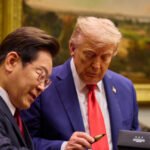Air Incheon’s cargo plane (Courtesy of Air Incheon)
South Korean flag carrier Korean Air Lines Co. has tapped Air Incheon, a local airline dedicated to cargo business, as the preferred bidder to acquire all stake in Asiana Airlines Inc.’s cargo unit for around 500 billion won ($361.8 million).
Korean Air, the country’s No. 1 full-service carrier set to acquire its biggest crosstown rival Asiana, will approve the cargo unit sale plan at its board meeting on June 17, according to investment banking sources on Friday.
There were three final bidders, Air Incheon, low-cost carriers Air Premia Inc. and Eastar Jet Co. for the cargo unit, of which total assets are valued at around 1 trillion.
“All bidders would have proposed similar purchase price based on the cargo unit’s earnings,” said a banking industry official. “As Air Incheon specializes in cargo transport, it would have had advantages in valuation, given the potential synergy with its existing business, and the operating plan,” added the official.
The sale of Asiana’s cargo unit is a condition that the antitrust body European Commission (EC) required in February for a definite nod for the merger of Korean Air and Asiana. Korean Air plans to complete the divestment by the end of October.
Air Incheon loads cargo onto its plane (Courtesy of Air Incheon)
EMERGENCE OF SMALLEST PLAYER
Air Incheon, which posted about 70 billion won in revenue last year, was the smallest player among the final bidders by sales.
Market insiders said the freight carrier appealed to Korean Air with its experience in operating many cargo-only flights and early fundraising from local financial investors Korea Investment Partners Co., Korea Investment & Securities Co. and Shinhan Securities Co.
Air Incheon is expected to become the second-largest cargo carrier in Korea by the acquisition of Asiana’s cargo division, which posted 1.61 trillion won in revenue last year.
Asiana’s cargo business ranked second with a 19.4% share of the local market in the first quarter of this year, following Korean Air’s 45.2%. Asiana operates 11 carriers for air freight, comprising eight it owns and three leased.
Asiana Airlines’ cargo plane (Courtesy of Asiana)
EXPECTED SYNERGY
Air Incheon was established in 2012 as the only Korean carrier dedicated to cargo business. Seoul-based Socius Private Equity, founded by the Korea Development Bank (KDB) former merger and acquisition expert Lee Byung-kuk in 2004, acquired a controlling stake in the airline in 2022.
The company looks to synergy between its existing assets, small cargo aircraft and Seoul Incheon-Southeast Asia operations, and Asiana cargo division’s large freight aircraft and operations for Seoul Incheon-the US and Seoul Incheon-Europe.
Asiana has transported cargo from Southeast Asia as belly cargo, the freight carried in a passenger aircraft, to Korea and loaded onto cargo planes to the US and Europe. This system has been efficient in generating profits for Asiana.
Similarly, Air Incheon plans to operate its small cargo aircraft from Southeast Asia to Korea and load the freight onto Asiana’s large freight planes bound for the US and Europe.
Air Incheon and Asiana’s cargo unit will jointly use freight-related infrastructure such as warehouses and cargo terminals in airports, which is expected to boost operational efficiency.
Airplanes of Korean Air and Asiana (Courtesy of Yonhap)
US APPROVAL AWAITED
The merger between Korea Air and Asiana will be accelerated upon Air Incheon’s deal.
Korean Air has received the EC’s approval for the merger under certain conditions, such as giving up some major routes between Seoul Incheon and Europe’s major cities and divesting Asiana’s cargo unit.
The conditions were set up to prevent the possible harm to market competition by the entity to be merged, which is expected to become one of the world’s 10 largest airlines.
Korean budget carrier T’way Air Co. agreed to take over Korean Air’s operations on the four routes in February – Seoul Incheon-Paris, Seoul Incheon-Rome, Seoul Incheon-Barcelona and Seoul Incheon-Frankfurt.
Korean Air has obtained approval or completed the review process of 13 of the 14 regulatory authorities across the world.
The carrier expects to receive approval from the US by October. Once it wins the US nod, the company aims to integrate the two largest airlines in Korea within two years.
By Jun-Ho Cha and Jong-Kwan Park
chacha@hankyung.com
Jihyun Kim edited this article.














